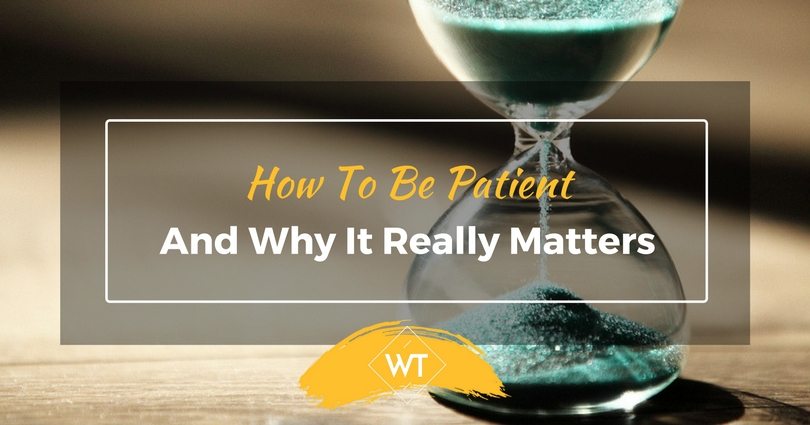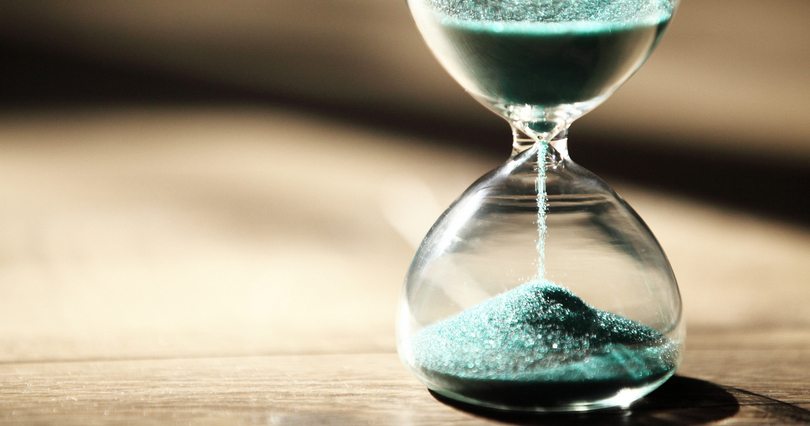How To Be Patient And Why It Really Matters

Trees that are slow to grow, bear the best fruit. ~ Moliere (Tweet this)
Do you know how to be patient? It’s a simple question, but really, when was the last time that you calmly waited out something important to you? That you invested your heart and soul in something and just peacefully let it be? When was the last time you gave a loved one the freedom to do whatever they want—even if it’s not something you really understand or like?
A person is a complicated mix of many traits, but when we focus we can feel what’s good for us and what isn’t. And once we know, we have no excuse not to try and become better versions of ourselves.
When was the last time you thought about patience?
The truth is that patience is at the very core of inner peace—a topic we like to explore here on Wisdom Times and possibly even what we’re all really struggling for. In fact, being patient is one of the few ways that you can demonstrate inner peace in measurable terms. And yet, we live in a society that is passionately against that virtue.
When we like someone, we want to have him or her now! When we start a business, we want immediate success! We start projects but never see them through. We start a new job and demand a raise.
We’re anxious and ungrateful, and usually quickly forget what we’ve already achieved and struggle to get to the next milestone. Only then will we be happy. Except when we get there, we’re ready for the next best thing. Before we talk about how to be patient, let’s define it.
Patience is bitter, but its fruit is sweet. ~ Aristotle (Tweet this)
What is patience?
The way to solve all that is to be more patient. You’ve probably heard that already. I’ve certainly always known that about myself and when my therapist gave me that advice a few weeks ago, I was like “duh!” But how? How do I become more patient?
She stopped me right there and brought me back to that “duh!” moment. And then it dawned on me—it was those “duh!” moments that were a huge part of the problem. Because I pretended I already knew something I really didn’t. I pretended I understood what patience is. Do you think you know what it is?
According to Google, which is one of my favorite sources of infinite knowledge, patience is “the capacity to accept or tolerate delay, problems or suffering.”
Do you think Google is right? Maybe technically it is, but if you believe in your heart and soul that’s what patience is, then you’re in big trouble, my friend. Because this definition makes patience seem bad. It truly does!
Tony Robbins himself says things like “you get what you tolerate, so raise your standards.” Many gurus and coaches repeat that and in the end, you get a world full of people that don’t want to tolerate anything. Why tolerate when you can raise your standards instead?
And of course, there’s the word “delay.” The suggestion that, whenever something happens in a timeframe different than what you have initially planned, it is “delayed.” And because you’re also thought things like “time is money,” you know delays are costing you! Which makes them bad.
And don’t even get me started with “problems” or “suffering!”
Ugh, patience!
He that can have patience can have what he will. ~ Benjamin Franklin (Tweet this)
The other side of patience
Like anything in this world, patience must have a positive side, right? Let’s try to find it. I warn you, it may be more difficult than you think. After all, you live in a culture where “tolerating delay” is the stupidest thing you can ever do!
So what can patience be associated with that’s positive? Here’s a short list:
1. Patience means inner peace
As I already mentioned, patience is one of the few measurable ways that you can use to understand whether you’ve found inner peace or not. Because inner peace means you are satisfied with life and with yourself, so you don’t need anything in particular to happen right freakin’ now so you can be happy.
2. Patience means being present
When you constantly hurry, you live in the future. That’s not entirely a bad thing, as people who live in the future are often the innovators and initiators of the world, but they also rush through life, never really appreciating it.
Live right here, right now. Pay attention to how you feel right here, right now. And keep in mind that if you feel like something is missing, it is very rarely because of circumstances. It’s usually because something deep inside you needs work.
3. Patience means understanding the signs
When you hurry and waste energy being anxious, you don’t have the chance to notice and understand what the universe is trying to tell you. Maybe the world around you is giving you signs as to why things are not happening right now or what you can do about that.
But in order to hear something, you need to be quiet. And when your head is exploding with thoughts about what the future may or may not look like, your mind is way too noisy to really understand.
4. Patience means gratitude
Most of our readers are high achievers that are eager to grow. This is why I know that you getting where you already are is a huge success. Why are you in a hurry for the next success? Sit back and enjoy. Be grateful. Appreciate. Thank yourself and the world. Give yourself a little break. You deserve it. There’s enough time for the new mountaintop.
5. Patience means joy
This is a consequence of the previous point more than anything else, but I thought it’s worth mentioning. When you’re grateful and give yourself the time to relax and enjoy, you feel joyful and happy.
And isn’t that the true meaning of life? What good can you do when you’re miserable? Bask in the feeling of joy and you’ll get both the answers and the strength you need to move forward.
6. Patience means confidence
Being patient means having faith in yourself and the world around you. Having faith that everything happens (or doesn’t happen) for a reason and that reason is positive. In fact, patience is one of the first qualities we develop when we are babies, along with the ability to trust, and the two are more connected than you know.
Patience is one of the first abilities that’s formed in a human being. According to traditional psychology, the process begins when we are under 1.5 years old. As a baby, when you need something, you cry or yell.
This is usually the point when others give you their full attention. If they always do—regardless of how long it takes—your mind learns that its needs are always met, even when it has to wait a bit longer.
But if your parents—or your nanny—decide to teach you discipline (which under the age of 1.5 years is a completely lost concept), you end up being an impatient, anxious human being, because you don’t trust that the world will give you what you need.
And while confidence is a concept we learn a bit later in life, it has a lot to do with whether we feel like we can handle with the world around us, or whether we feel that we can’t understand this world.
Water does not resist. Water flows. When you plunge your hand into it, all you feel is a caress. Water is not a solid wall, it will not stop you. But water always goes where it wants to go, and nothing in the end can stand against it. Water is patient. ~ Margaret Atwood, The Penelopiad (Tweet this)
How to be aware of being impatient?
One of the problems with overcoming impatience is the fact that we don’t know it’s the cause of feeling anxious. If you’re an active person who goes after his goals, does this mean you’re necessarily impatient? Does this mean you’re necessarily stressed out? No, it doesn’t. But here’s what might be translated into chronic impatience:
1. You feel the constant need to do something
I realized something was off when I was about to go through a very serious medical procedure that I didn’t need. The story is this: my husband and I are trying to have a baby. But the baby is refusing to have us. We go through various tests and everything is fine. A doctor tells me to calm down and keep trying. I tell him he’s a loser.
When not being able to do anything in order to move a situation forward makes you feel like a helpless shadow of a man/woman, then you definitely need to work on becoming more patient. Because sometimes in life there’s nothing you can do but wait. And that’s not all bad.
2. You tend to compare yourself with others
Your path is your path. It looks nothing like the path of anyone else around you, even when there are similarities. Someone will always have more money than you; or be married when you’re single; or be single when you’re married; or look better without trying… This doesn’t make you any less of an amazing creature.
You have your own path you need to follow, your own mission that was given to you when you came to this world, and trying to compete with others on how well they’re accomplishing their missions is only going to distract you. Don’t waste precious time and energy in this. You don’t have to prove anything to anybody. Work on being patient with yourself and just do what makes you happy. In time, the universe will send you what’s best for you—even if it’s not exactly what you’ve imagined.
3. If things aren’t happening your way, you lose sleep
Do you get anxious or worried when something isn’t going according to plan? Would you say you’re a flexible person who takes life as it comes, or do you like to have things under control? Funny thing about control: we never really have any.
However, if you’re the type who plans everything—and most high achievers are exactly that type of people—chances are you’ll flip out and lose patience the second something goes wrong. And what are the chances of something always going wrong? That’s right, close to 100%. It’s just how life goes.
When you’re repeating this behavior, it becomes a habit, and the habit turns into chronic impatience. Because you need to know things will be alright in order to rest easy, you need to know it right now. But you can’t. So you’re perpetually looking forward to something in order to be happy. Welcome to the cycle of unhappiness!
4. You expect people around you to be more ambitious than they are
If you’re wondering why your best friend isn’t going for that promotion or why your partner isn’t up for going back to school to get extra qualifications, you’re probably a person who always needs to do something and you don’t understand how others are capable of just… enjoying their life.
Doers are an interesting kind of people. Granted, they achieve a lot in life, but are they ever truly happy? Traditional psychology claims doers always do because they don’t want to stop and think about the things that are hurting them.
This makes for a fragile inner balance and low self esteem. So what will happen if you just stop whatever you’re doing and trying to focus on what you’ve already done? If you find that to be a very weird suggestion, you’re definitely an impatient one and I do suggest you spend some time just sitting with yourself.
So… how to be patient?
If you get now why patience is important, you’re probably wondering how to be patient. Well, I’m not going to lie, it’s not an easy thing to do. But for the past few weeks, I worked hard on that and I think I’m getting somewhere. Here’s a lot of the things I do (and why they work so well).
1. Work on your emotional intelligence
In short, being emotionally intelligent means being aware of your own and of other people’s emotions, as well being capable of recognizing the empowering from dis-empowering ones and switching the dis-empowering ones off. While this sounds like something difficult to do, we’ve made it all extremely easy to understand and apply in our Wisdom Times Emotional Intelligence Video Course….coming soon!
So how will high EI levels help? For one thing, you will manage to handle all the negative emotions that impatience brings and substitute them for peace and relaxation. But what’s even more important is that you’ll realize that you can be just as happy as you want to be even if whatever you’re waiting for isn’t happening as fast as you’d like—or doesn’t ever happen.
This is the moment to share a story that I think can help the especially impatient ones. When I was younger, I constantly felt anxious and worried. I wanted to earn more and I didn’t. I lost sleep over whether I would pass my university exams. I constantly pushed my boyfriend to do more and called him lazy. A couple of years in that state were enough for me to start having panic attacks and I had to be put on very strong, addictive sedatives. Yes, that’s what being impatient can do to you.
During one of the visits in my neurologist’s office, he suggested pills that I knew my grandmother used to take—and they practically changed her personality. That was it for me! I wasn’t going to spend my life like that!
This is when I read about a simple emotional intelligence technique that I use to this day when I feel… uncomfortable. Here it is:
Take a piece of paper (you can also do it on your computer, phone or whatever is convenient) and write down the following things:
- What’s making you nervous right now. You can list everything that makes you nervous, but focus on one specific thing at a time and describe what you hate about it. Write down everything you feel, no censure.
- Write down all the things you feel like doing because of that thing that bugs you—or all the negative ways to handle it. Here you can put yelling, picking a fight with your boyfriend or boss, complaining, feeling sorry for yourself, overeating, smoking, getting drunk. All these things that you know in your heart will lead to nothing good, but you feel like they are the only outlets of emotion (they’re not).
- Now, finally, write down the positive things you can do to solve the problem. When I first started doing this, this part was really challenging. I didn’t see positive ways to handle all the stress. But with time and focus, it all started flowing. I realized that wasn’t the man for me and my being angry that he doesn’t do a lot is just because I was looking for reasons to break up with him. So I did. I realized I would never make more money doing what I did back then, so I quit and found a job with growth potential. I also realized that it wasn’t about not having enough money, but about how I manage it—so I became better at that too. It all started coming together, I calmed down and the panic attacks disappeared. Which is why, as a coach, writer and a person I will never stop saying that increasing your emotional intelligence is one of the best things you can do for your health and wellbeing. And of course, for becoming more patient.
2. Slow down
This may be difficult to do if you live in a big, fast-paced city like London or New York, but wherever you are and whatever you do for a living, it’s important to slow down. Even when I was a corporate manager, I took at least an hour out of my work day to just do nothing—and I also insisted all of my employees did it. Why? When you do nothing and your mind wanders, you come up with the greatest ideas and notice potential issues way before they’ve happened.
But this article isn’t about business. Take long walks, lay awake in your bed, meditate. Slowing down in every aspect of your life will give you the feeling of being comfortable with whatever is, rather than expecting whatever will be. And that is the key to patience.
3. Exclude “Have To” from your vocabulary
Don’t you just hate it when you “have to” do something? The moment you say that, even only in your mind, it sounds like a burden that you’re bound to carry until it’s done. And so you become impatient for it to be done.
Instead of using “have to,” replace it with “want to.” Yes, I know you don’t always want to do all the things you have to do, but even just this simple switch in vocabulary can make you more energetic, happier and more involved with the present rather than the future. Language and the way we speak to ourselves and each other is a major part of who we are and how we live our lives. Let’s want to live them!
If you really, really don’t want to do most of things you have to do on daily basis, it’s time for a serious change, my friend!
4. Learn how to breathe
It sounds simple enough, doesn’t it? Maybe even a bit insane, as we’re all born knowing how to breathe. Or are we?
The thing with the breathing is that very few of us pay attention to it, even from time to time. At the same time, our breathing patterns play massive role in our physical and emotional reactions.
If you just learn how to take full breaths from your diaphragm and spend but a few seconds daily focused on nothing but the way you breathe, you will see a great change in the way you see the world—and part of that change is becoming more patient and just letting things be.
5. Become aware of the reason you’re impatient
And when I say the reason, I don’t mean the technical reason, like “can’t wait to make my first sale” or “can’t wait for that guy to call me.” I mean what would that thing you’re waiting for give you? How would you feel when it happens? Free? Calm? Validated? What is the reason that you’re not able to feel all those things right now?
When you identify what you’re so desperately looking to achieve—but what’s the desire behind it, not just the thing itself—you can figure out what in your life right now is offering you the same emotion and gain patience by focusing more on that.
Patience is power. Patience is not an absence of action; rather it is “timing.” It waits on the right time to act, for the right principles and in the right way. ~ Fulton J. Sheen (Tweet this)
6. Practice patience by waiting more often
You’d think there are no different ways to wait, but there actually are. And for us to learn to wait the right way, we need to practice it. For example, delay instant gratification by postponing a trip you really want to take for when you can afford to do it the right way and start saving for it right now. Or push watching the latest episode of your favorite show to a week later—avoiding any spoilers, of course.
In general, a great way to practice patience—and something that will affect your finances in an extremely positive way, too—is learning to save up for something and buy it with your savings, rather than on credit.
7. Don’t watch your watch, phone or e-mail constantly
For better or worse, we live in a world where we’re constantly urged to take action—and expect the same from others. Try to get out of that catch-22 by not checking your work e-mails after work hours; not checking your Facebook even after you’ve posted something; even not picking up your phone when you don’t feel like talking to someone or about something.
Another thing we do that makes us more impatient is always be aware of what time it is. Why is that necessary? Really, ask yourself. Even most of the time during working hours, you don’t really need to know the time.
It would be best if you take your watch off and consciously decide to look for the time only at certain moments during the day (when you know lunch is near or when you’ve scheduled a dinner with a friend).
8. Limit watching the news to a minimum
If you think about it, you’ll see that the news gives you a weird illusion that the world around you—and you as part of it—is progressing. And when things are not progressing in our own life, this becomes addictive.
The problem is that media puts the stress mostly on negative news, which affects the way you see the world around you. This makes you even more impatient, because now you want things to get better and you’re anxious when you see that they don’t. And if you watch news, you should know by now that according to journalists, they never will.
Here’s the truth: things are getting better slowly, but steadily. All you have to do is sit back and relax—at least from time to time. And turn the TV off.
9. Do yoga, exercise, eat well
It is a well-known fact that your physical and psychological well-being are tightly connected. If your brain is too busy with digestion or cleaning out toxins from your body, you are less effective at work, in your relationships and even at relaxing. And when you can’t achieve what would make you happy, you become anxious and impatient.
Taking care of your body, including exercising, eating well, drinking a lot of water, will make you more energetic and focused. And doing yoga—which is one of my favorite sports—will keep you balanced and create the good habit of breathing correctly, which we already discussed.
Why is patience so important? because it makes us pay attention. ~ Paulo Coelho (Tweet this)
10. Focus on the now
Ahh, the positives of being present. It is quite obvious that the impatient people tend to live in the future. What is right now is never enough for them. They’re only attracted to what will be. There’s just one problem with that: there comes a day when what will be becomes what is.
I’m sure that, whoever you are in your life right now, there is so much to enjoy and be grateful for. There’s so much you’ve achieved. There’s so much you’ve overcome. There’s so much you love. And while we all live with the hopes and dreams of a better future—whatever that entails—all we truly have is the present moment. So take a deep breath and enjoy it.
Still feeling impatient? If you’ve done most of the tricks above and you’re now aware of what it all means, you’ll notice this feeling of calmness and joy filling you up from the inside. And as you do, I’d like to bring your attention to a common fear among impatient high-achievers: boredom. If you don’t constantly do something, if something is not happening, changing, improving… you get bored. Does that sound familiar?
Well, here’s a new perspective:boredom is great. Sometimes we get lost in all we have to do and all we want to achieve for reasons that aren’t really as authentic as we think and we forget to do what makes us happy and try out new things. Boredom is the best cure of that. When you’re bored—when you don’t really have to do anything—that’s when you discover what you really want. And when you do what you really want, you’re unstoppable.
So there you have it. Patience and boredom through a whole new perspective. A perspective that won’t change your life in the future—it has started to change it the moment you read this article.
No pain that we suffer, no trial that we experience is wasted. It ministers to our education, to the development of such qualities as patience, faith, fortitude and humility. All that we suffer and all that we endure, especially when we endure it patiently, builds up our characters, purifies our hearts, expands our souls, and makes us more tender and charitable, more worthy to be called the children of God. ~ Orson F. Whitney (Tweet this)









Leave a Reply